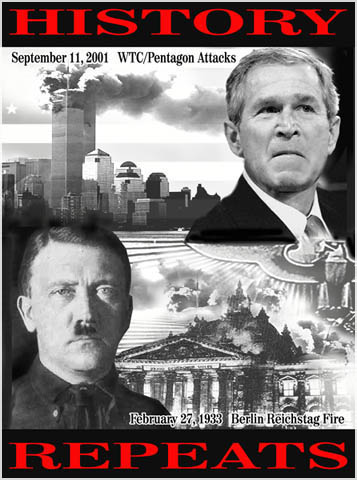Reichstag Fire, February 27, 1933
Nazis burned the German parliament, blamed a Communist (the lone arsonist theory) and "temporarily" suspended civil liberties to deal with the emergency
"History doesn't repeat, but sometimes it rhymes"
-- paraphrase of comments made by Mark Twain (American patriot and anti-imperialist)"The government will make use of these powers only insofar as they are essential for carrying out vitally necessary measures...The number of cases in which an internal necessity exists for having recourse to such a law is in itself a limited one."
-- Adolf Hitler, promise to the Reichstag (Parliament) on the occasion of the imposition of "temporary" dictatorship following the "Reichstag Fire."
www.historyplace.com/worldwar2/timeline/enabling.htm
on this page:
related pages:
|
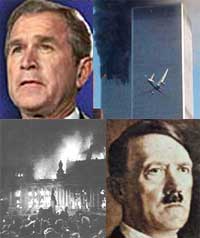 |
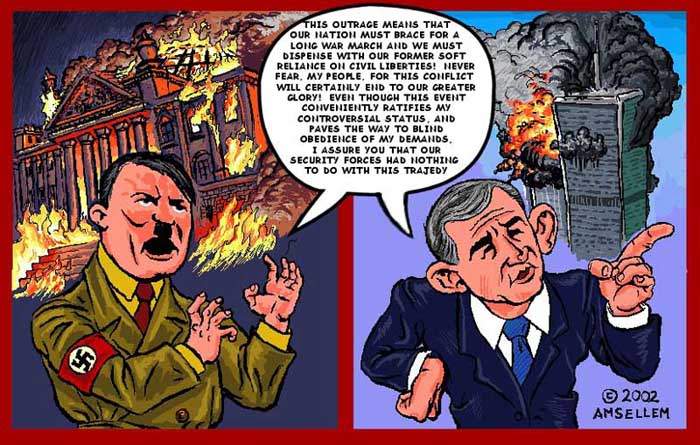
On February 27, 1933, after Hitler came to power, the Nazis burned down the Reichstag (Parliament) building and blamed it on the Communists to justify a "temporary" suspension of civil liberties to cope with the terrorist threat. This is how Hitler became an absolute dictator. The "temporary" suspension of freedom lasted until Germany was in ruins. The most likely scenario for 9/11 is "Hijacking the Hijackers with Remote Control," explained in detail at Understanding the Paradigms of 9/11 In summary, an early incarnation of 9/11 called "Bojinka" was intercepted and stopped in 1995 (terrorists planning it were arrested and tortured in the Phillippines). Mainstream news sources admit that several of the "hijackers" were given training on US military bases. The "Able Danger" defense intelligence program tracked Mohammed Atta and other plotters years before 9/11. On the big day, it is extremely unlikely that the alleged hijackers would have been able to perform the 270 degree spiral into the nearly empty part of the Pentagon. And it wasn't anyone Islamic who ignored copious warnings from foreign governments and FBI agents that the attacks were imminent (what, when, where), and paralyzed the air defenses with multiple wargames while the actual events took place. |
"Terrorism is the best
political weapon for nothing drives people harder than a fear of sudden
death."
-- Adolf Hitler
"In Germany, the Nazis
first came for the communists, and I did not speak up, because I was
not a Communist. Then they came for the Jews, and I did not speak up,
because I was not a Jew. Then they came for the trade unionists, and
I did not speak up, because I was not a trade unionist. Then they came
for the Catholics, and I did not speak up, because I was not a Catholic.
Then they came for me... and by that time, there was no one to speak
up for anyone."
-- Martin Niemoeller, Pastor, German Evangelical (Lutheran) Church (1892-1984)
"The government will
make use of these powers only insofar as they are essential
for carrying out vitally necessary measures...The number of cases in
which an internal necessity exists for having recourse to such a law
is in itself a limited one."
-- Adolf Hitler, promise to the Reichstag (Parliament) on the occasion
of the imposition of "temporary" dictatorship following the
Reichstag Fire
www.historyplace.com/worldwar2/timeline/enabling.htm
Hermann Goering, Hitler's deputy:
"Why of course the people don't want war. Why should some poor slob on a farm want to risk his life in a war when the best he can get out of it is to come back to his farm in one piece? Naturally the common people don't want war: neither in Russia, nor in England, nor for that matter in Germany. That is understood. But, after all, it is the leaders of the country who determine the policy and it is always a simple matter to drag the people along, whether it is a democracy, or a fascist dictatorship, or a parliament, or a communist dictatorship. Voice or no voice, the people can always be brought to the bidding of the leaders. That is easy. All you have to do is tell them they are being attacked, and denounce the peacemakers for lack of patriotism and exposing the country to danger. It works the same in any country."
"Until we go through it ourselves, until our people cower in the shelters of New York, Washington, Chicago, Los Angeles and elsewhere while the buildings collapse overhead and burst into flames, and dead bodies hurtle about and, when it is over for the day or the night, emerge in the rubble to find some of their dear ones mangled, their homes gone, their hospitals, churches, schools demolished - only after that gruesome experience will we realize what we are inflicting on the people of Indochina ..."
-- William Shirer, 1973 -- author, "The Rise and Fall of the Third Reich : A History of Nazi Germany"
| Time to Connect the Dots |
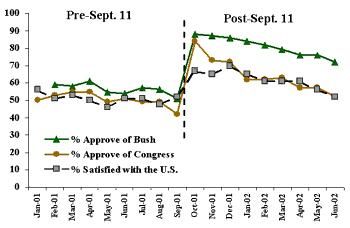

| parallels between the Reichstag Fire and 9/11 |
Both events were used by an unpopular minority leader to squelch opposition. Both events had convenient patsies - and a public intimidated from asking questions about the details. Both events could not have happened (physically) as the unpopular leader claimed (Mr. Van Der Lubbe couldn't have possibly set all of the fires as quickly as the Nazis claimed, just like there's no way that flight school dropouts flew the plane into the nearly empty part of the Pentagon in a high speed spiral). Both events were immediately followed by a "temporary" suspension of civil liberties to deal with the terrorist threat.
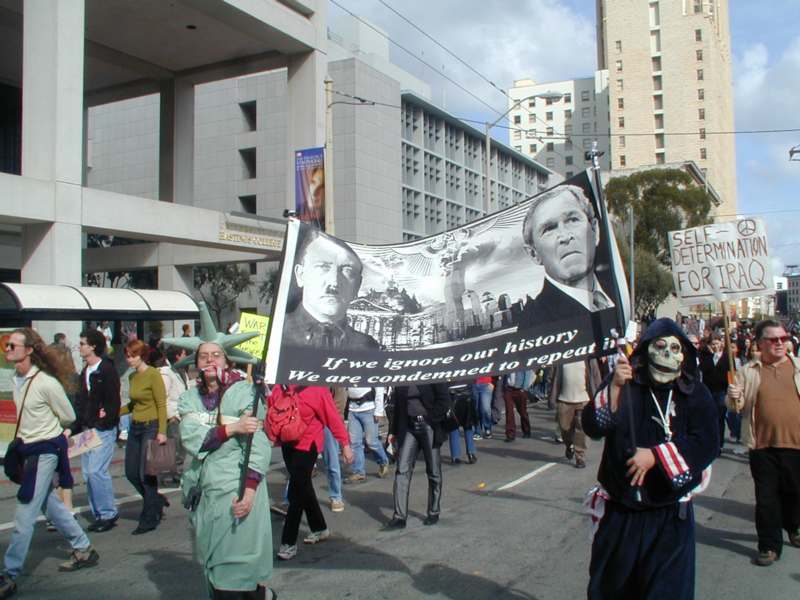
San Francisco peace rally - February 16, 2003
www.oilempire.us/pnac.html
the
"Project for a New American Century" - the "Mein Kampf"
of the Fourth Reich
(In September 2000, the PNAC published a report that stated a
"new Pearl Harbor" would enable its plans for global domination.)
Parallels |
|
| Hitler's book Mein Kampf (My Struggle) , written in 1925 while he was in jail for an attempted coup (putsch), explicitly described his goals for world domination, stealing Russia for German expansion, and mass murdering Jews with poison gas. It was dismissed as the ravings of a lunatic by most observers. | The Project for a New American Century, a think tank
comprising most of the "neo-conservatives" in key leadership
positions in the Bush / Cheney regime, published a report in September,
2000 titled "Rebuilding America's Defenses." This report,
which was endorsed by Cheney, Jeb Bush, Rumsfeld, Wolfowitz and the
rest of the gang, predicted that their goals of world domination would
be difficult unless there was a "new
Pearl Harbor." The PNAC report also noted "the
need for a substantial American force presence in the [Persian] Gulf
transcends the issue of the regime of Saddam Hussein"
..., and genetically engineered biological weapons "may
transform biological warfare from the
realm of terror to a politically useful tool." This PNAC report is the "Mein Kampf" for World War IV. |
| Hitler rose to power under the veneer of legality, ensuring that each tiny step toward dictatorship seemed legitimate. | The Bush regime appeared (to many) to have been legitimately elected, if you didn't look too closely at the deliberate disenfranchisements of Democrats in Florida. This sneaky cloaking to steps toward dictatorship in the guise of legality is probably the strongest parallel between the tactics of the Nazis and the tactics of the Bush regime. |
| Reichstag Fire (February 27, 1933) and the refusal of most Germans to question the official story | September 11, 2001 and the refusal of most Americans to question the official story |
| Enabling Act passed after Reichstag Fire to temporarily suspend civil liberties to deal with the terrorist threat posed by Communists. The temporary emergency lasted until Germany was in ruins in 1945. |
USA Patriot Act passed shortly after 9/11 to temporarily suspend civil liberties to deal with the terrorist threat posted by Islamic fundamentalists. The proposed sequel to Patriot Act is closer to the Enabling Act in content, but public outcry kept it from being enacted as a complete act. If there is another 9/11 type incident, Patriot II is more likely to be passed. Among other provisions, it would remove citizenship from convicted terrorists, similar to the removal of German citizenship of German Jews, a key "legal" step toward their expulsion to concentration and death camps. |
| Dachau (earliest internment camp, which incarcerated political opponents, it was not a "death camp," at least in early days) | Guantanamo indefinite detention camp, built by Haliburton, President Cheney's company |
| Propaganda ministry | Fox News, Rush Limbaugh, Ann Coulter, etc. |
| Kristallnacht (1938), a deliberate effort to destroy Jewish history in Germany | Destruction of Iraqi museums (2003), which destroyed much ancient history, especially relics that were pre-Islamic, part of the cultural heritage of humanity |
| Invasion of Czechoslovakia, aggression that the other "great powers" condemned but did nothing to stop | Invasion of Iraq using the excuse that Iraq had attacked, or was about to attack US (2003) |
| Excuse that Poland was attacking Germany and therefore must be counter-attacked in self-defense (1939) | US attack on Iran, a country that recently made large business deals with China, India and Germany - expanding the Iraq war to Iran could trigger a much larger conflict |
| Reluctance of the opposition to organize to restore democracy, several efforts were made to topple the dictator but all were half-hearted, poorly organized and none (obviously) succeeded. | The establishment opposition to Bush, Cheney and the other gangsters involved in the crimes of 9/11 and Iraq has been weak and ineffective. Few Democratic leaders were willing to publicly question the vote fraud of 2004 despite overwhelming evidence that the election was rigged in many states (not only Ohio). While there has been violence directed against some opposition politicians (Paul Wellstone, John Kennedy, etc), the danger in the US for dissidents is miniscule compared with Nazi Germany and there is much more freedom of speech and movement and association. |
| ethnic biowar: the new Holocaust? www.commondreams.org/views03/0910-15.htm The Genetically Modified Bomb by Thom Hartmann Wednesday, September 10, 2003 |
|
The Rise and Fall of the Third Reich by
William L. Shirer
Simon and Schuster, 1960 - hardcover
from pages 188 - 196
THE NAZIFICATION OF GERMANY:
1933–34
www.truthout.org/docs_2006/081806A.shtml
The Constitution: Checking a Would-Be King
By Ray McGovern
t r u t h o u t | Perspective
Friday 18 August 2006
On February 27, 1933, four weeks after Hitler was sworn in as Chancellor, the Reichstag building, Germany's parliament was destroyed in a fire. Hitler took full advantage of this 9/11-like calamity to whip up fear of "terrorists" - in this case, Communist terrorists - and to impose legislation curtailing the rights of German citizens. The Germans, by and large, acquiesced.
In Defying Hitler: A Memoir, Sebastian Haffner provides an eyewitness account of those days in Berlin:With sheepish submissiveness the German people accepted that, as a result of the fire, each one of them lost what little personal freedom and dignity was guaranteed by the constitution; as though it followed as a necessary consequence.... more than one [of my colleagues] hinted that they had doubts about the official version; but none of them saw anything out of the ordinary in the fact that, from now on, one's telephone would be tapped, one's letters opened, and one's desk might be broken into. (pp 121-122)
www.deceptiondollar.com/news/BloorRemarks911-03.htm
20 parallels between Bush’s America
and Hitler’s Germany.
Remarks from BLOOR CINEMA EVENT panel, Toronto, 9/11/2003 By Barrie
Zwicker
Barrie Zwicker in Toronto Regarding Reichstag Fire/911
www.leftgatekeepers.com/articles/BarrieZwickerReichstagFire.htm
Van der Lubbe was the patsy in the Reichstag fire. Seventy years later you have some "ex-CIA" types still utilizing him in this way. As well they might, considering what's at stake.
According to historians I've read, Van der Lubbe was *an* arsonist at the Reichstag, but not the lone arsonist and definitely not the arsonist responsible for the conflagration. More on why he was on the scene that night, below.
But for argument's sake allow for a moment that he was the *lone* arsonist. Even if he *were,* it is misleading to make that assertion in such a way as to suggest little or no Nazi involvement in the events of February 27, 1933.
Everything else indicates the Nazis were the only beneficiaries of the fire, as iconic in its day as 9/11 in ours.
First take the possibility he was the lone arsonist. He was below par mentally and therefore a person easily duped. It is interesting -- especially in light of the large body of circumstantial evidence pointing to Nazi complicity -- that those who claim or suggest that Van der Lubbe was the lone arsonist seldom if ever show any interest into whether he might have been manipulated. In any event, the "lone arsonist" theory does not conform to the facts.
Consider this from William L. Shirer's The Rise and Fall of The Third Reich (Touchstone Edition, 1990, p. 192-):
From Goering's Reichstag President's Palace an underground passage, built to carry the central heating system, ran to the Reichstag building. Through this tunnel Karl Ernst, a former hotel bellhop who had become the Berlin S.A. leader, led a small detachment of storm troopers on the night of February 27 to the Reichstag, where they quickly scattered gasoline and self-igniting chemicals and then made their way quickly back to the palace the way they had come. At the same time a half-witted Dutch Communist with a passion for arson, Marinus van der Lubbe, had made his way into the huge, darkened and to him unfamiliar building and set some small fires of his own. This feeble-minded pyromaniac was a godsend to the Nazis. He had been picked up by the S.A. a few days before after having been overheard in a bar boasting that he had attempted to set fire to several public buildings and that he was going to try the Reichstag next.
The coincidence that the Nazis had found a demented Communist arsonist who was out to do exactly what they themselves had determined to do seems incredible but is nevertheless supported by the evidence. The idea for the fire almost certainly originated at the top with Goebbels and Goering. Hans Gisevius, an official in the Prussian Ministry of the Interior at the time, testified at Nuremberg that 'it was Goebbels who first thought of setting the Reichstag on fre,' and Rudolph Diels, the Gestapo chief, added in an affidavit that 'Goering knew exactly how the fire was to be started' and had ordered him 'to prepare, prior to the fire, a list of people who were to be arrested immediately after it.' General Franz Halder, Chief of the German General Staff during the early part of World War II, recalled at Nurembrg how on one occasion Goering had boasted of his deed.
At a luncheon on the birthday of the Fuehrer in 1942 the conversation turned to the topic of the Reichstag building and its artistic value. I heard with my own ears when Goering interrupted the conversation and shouted: "The only one who really knows about the Reichstag is I, because I set it on fire!" With that he slapped his thigh with the flat of his hand.
Shirer writes (p. 193): "Van der Lubbe, it seems clear, was a dupe of the Nazis. He was encouraged to try to set the Reichstag on fire. But the main job was to be done -- without his knowledge of course -- by the storm troopers. Indeed it was established at the subsequent trial at Leipzig that the Dutch half-wit did not possess the means to set so vast a building on fire so quickly. Two and a half minutes after he entered, the great central hall was fiercely burning. He had only his shirt for tinder. The main fires, according to the testimony of experts at the trial, had been set with considerable quantities of chemicals and gasoline."
Consider that Vice-chancellor von Papen recalled that when he arrived at the blazing parliament buildings Goering was already on the scene shouting: "This is a communist crime..."
Shirer writes: "...beyond reasonable doubt it was the Nazis who planned the arson and carried it out for their own political ends."Indeed, the more you study the Reichstag fire, its origins and uses, the more you see what a stunning parallel to it 9/11 is -- on the face of it, as well as in some of the intricacies.
BarrieZ in Toronto
www.commondreams.org/views02/0913-03.htm
Published on Friday, September 13, 2002 by CommonDreams.org
Bush's 9/11 Reichstag Fire
by Harvey Wasserman
www.nathancallahan.com/mcgovern.html
My Briefing with Ray McGovern
George Tenet, Iraq, Neo-Conservatives, Vietnam and 911 through the eyes
of a 27-year CIA analyst
“I saw it in Vietnam,” he says. “And usually it was the President himself or the White House that was responsible in the final analysis. Think Gulf of Tonkin.”
McGovern is referring to the non-event that became the rationale for the escalation of U.S. involvement in Vietnam.
“We knew that there was no incident that night," McGovern says. "McGeorge Bundy [Lyndon Johnson's National Security Advisor] knew that there was no incident that night. And yet LBJ with his towering presence, his total power — corrupting totally — leaned over and said ‘McGeorge, are you going up to the hill to sell this resolution?’ Bundy admitted on McNeil Lehrer Newshour, one painful show: ‘So, I went. I went up and I lied to Congress.’
“So, it’s happened before. What’s different this time is that we have a situation where, over a two-year period, an incredibly clever orchestrated campaign was waged to exploit the trauma of the American people — the trauma of 911. To exploit it in such a way as to achieve the aims of the…“
McGovern stops to find the word.
“I don’t call them neo-conservatives," he says, "because I’m conservative. I call them neo-fascists, because that’s what they are. And what these neo-fascists did was see 911 as a golden opportunity.”
Holy Benito! Neo-fascists? I ask McGovern if he's using Mussolini’s definition of fascism. As Il Duce said, "Fascism should more properly be called corporatism, since it is the merger of state and corporate power." Think Halliburton U.S.A.
McGovern agrees, but adds more.“I’m also talking about the measures that were taken in Nazi Germany after the fire that burned down the Reichstag, Germany’s parliament building, in 1933. It was that fire that allowed Hitler to institute his own legislation."
McGovern draws a parallel between 911 and the Reichstag fire. After claiming that the Communists committed arson, Hitler used the incident to declare a state of emergency and suspend some of the constitutionally protected personal freedoms of German citizens. These rights included freedom of speech and assembly.
“Very much like post-911 legislation instituted here in this country to curtail civil liberties,” McGovern says, "to make people feel that if they speak out against what is happening, they are unpatriotic."
| What was the Reichstag Fire? |
www.prop1.org/park/reichsta.htm Reichstag fire, burning of the Reichstag (parliament)
building in Berlin, on the night of Feb. 27, 1933, a key event in the
establishment of the Nazi dictatorship and widely believed to have been
contrived by the newly formed Nazi government itself to turn public opinion
against its opponents and to assume emergency powers. Hitler had secured
the chancellorship after the elections of November 1932, but his Nazi
Party had not won an overall majority. He therefore obtained Cabinet consent
to fix new elections for March 5, 1933. Meanwhile, his propaganda minister,
Joseph Goebbels, is supposed to have devised the scheme whereby 10 agents
led by Karl Ernst were to gain access to the Reichstag through a tunnel
leading from the official residence of Hermann Goring, Reichstag president
and Hitler's chief minister, who was then to conduct an official investigation,
which would fix responsibility for the fire on the Communists. The supposed
arsonist was a Dutchman, Marinus van der Lubbe, whom some have claimed
was brought to the scene of the crime by Nazi agents. Others have contended
that there was no proof of Nazi complicity in the crime, but that Hitler
merely capitalized on van der Lubbe's independent act. The fire is the
subject of continued debate and research. |
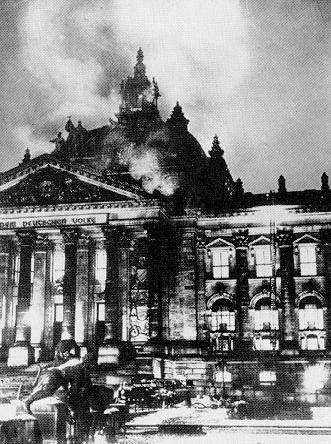 |
Additional Information About the Reichstag Fire
Shortly before election day, the Reichstag building went up in flames-most
probably at the initiative of the Nazis themselves. Hearing about the
arson, Hitler reportedly first said, "Now I've got them in my hands."
The Nazis exploited the torching of the Reichstag to describe the act
as a manifestation of an attempted Communist putsch and, on the basis
of this allegation, to legitimize an all-out war against the Communists.
That very night, Goering declared a supreme state of emergency throughout
his police forces. The Nazis rounded up 4,000 political activists, mostly
Communists, but including several non-Communist intellectuals. The headquarters
and newspaper editorial boards of the Social-Democratic party were taken
over. The heads of the Communist party in the Reichstag turned themselves
over to the police voluntarily to prove that the charges were groundless.
The next morning, Hitler presented President von Hindenburg with an emergency
order, ready for his signature, that voided important basic civil rights,
expanded substantially the list of crimes that carried the death penalty,
and vastly boosted the central government's powers to pressure the individual
states. The police were now empowered to imprison suspects and extend
remand indefinitely at their discretion. They could keep relatives utterly
uninformed about the reason for the arrest and the fate of the imprisoned
person. They could prevent lawyers or other people from visiting detainees
and reviewing their files. No court was entitled to intervene. The emergency
order, "for the protection of the people and the State," was
augmented that very day by an order "against treason and treachery."
The two orders became the basis of jurisprudence and the foundation stones
of the Nazi dictatorship.
Thus, the emergency order of February 28, 1933, read:
"Paragraphs 114, 115, 117, 118, 123, 124, and 153 in the German Reich Constitution are provisionally null and void. Accordingly, the restrictions on personal freedom and the right to express opinions freely, including freedoms of the press, association, and assembly; monitoring of letters, cables, and telephone calls, searches of homes, and expropriation of property, and restrictions thereon, are hereby revoked within the limits previously stipulated in the law."
The order, to be in effect until 1945, replaced constitutional rule with a perpetual state of emergency.
Book Review
The Reichstag Fire, 68 years on
Alexander Bahar, Wilfried Kugel:
Der Reichstagbrand - Wie Geschichte gemacht wird
(The Reichstag Fire - How History is Created), edition q, Berlin 2001,
ISBN 3-86124-523-2,
864 pages, price: 68.00 DM
A guest review by Wilhelm Klein
5 July 2001
www.wsws.org/articles/2001/jul2001/reic-j05.shtml
2-27-1933
Just days before the crucial election of March 5th, a fire destroys the
main chamber of the Reichstag in Berlin; the Nazis immediately declare
that this is the work of the Communists. Minister without Portfolio Hermann
Göring shouts to the new Gestapo chief: "This is the beginning
of the Communist revolution! We must not wait a minute. We will show no
mercy. Every Communist official must be shot , where he is found. Every
Communist deputy must this very night be strung up." [The following
day Hitler persuaded President von Hindenburg to sign an emergency decree
that suspended seven crucial articles of the Constitution: freedom of
the person, freedom of expression, freedom to assemble, secrecy of mail
and other forms of communication, sanctity of property and of the home
as a place of refuge. Trucks of brown-shirted SA (Sturm Absteilung) thugs
swarmed over Berlin and the provinces, breaking into homes, and carting
victims off to be beaten and tortured. Over four thousand Communist leaders
and Social Democrats were arrested, including many members of the Reichstag.
The opposition press was closed down, and ten-year prison sentences were
given to any person providing news to foreign governments that was "not
in the best interests of Germany". Opposition rallies were banned
or broken up by bullies; only the Nazis and their Nationalist Party allies
were able to campaign unmolested. It was widely believed, in Germany and
abroad, that the fire had been set by the Nazis themselves.]
The fire was ostensibly set by Marinus van der Lubbe, a dim-witted Dutch
communist who liked to play with matches. He was picked up by the SA after
he had been heard boasting in a bar that he would set fire to the Reichstag.
They encouraged him with his plans, but first a group of SA men (later
eliminated by Hitler in the Night of the Long Knives, 6-30-34) carried
quantities of gasoline and self-igniting chemicals through an underground
passage from Göring's headquarters to the Reichstag which they scattered
in strategic places. At van der Lubbe's trial in Leipzig it was clear
that he could not have set such fierce fires and in so many places simultaneously
with the meager materials he had brought. He was, nevertheless, convicted
and decapitated. Shirer, Rise and Fall, pp. 192-195; Sherwin and Markmann,
One Week in March, (1961) pp. 81-83.
www.janrainwater.com/htdocs/Reichstag.htm
| Poland 1939, Iraq 2003 |
Jimmy Breslin
Familiar, Haunting Words
March 20, 2003
www.newsday.com/news/local/newyork/columnists/ny-nybres0320,0,974243.column?coll=ny%2Dtop%2Dheadlines
At 8 o'clock Wednesday night, the Sikh in a blue turban
in the subway change booth at 42nd Street gave me a little wave and I
waved back. Suddenly, he was a front-line soldier in a war. I designate
the subway at Times Square as a prime target in America in the war with
Iraq.
I had just been at the public library, where I discovered the speech that
started World War II. I print much of it here. It is darkly familiar to
what we have been hearing here, when for the first time in American history
we became all the things we ever hated and invaded another country. Herewith
the speech:
Address by Adolph Hitler to the Reichstag, Sept. 1, 1939.
For months we have suffered under the torture of a problem which the Versailles Diktat created -- a problem that has deteriorated until it becomes intolerable for us ...
As always, I attempted to bring about, by the peaceful method of making proposals for revision, an alteration of this intolerable position. It is a lie when the outside world says that we only tried to carry our revisions through by pressure. Fifteen years before the National Socialist Party came to power there was the opportunity of carrying out these revisions by peaceful settlements and understanding. On my own initiative I have, not once but several times, made proposals for the revision of intolerable conditions. All these proposals, as you know, have been rejected -- proposals for the limitation of armaments and, even if necessary, disarmament, proposals for the limitation of warmaking, proposals for the elimination of certain methods of modern warfare ... You know the endless attempts I made for peaceful clarification and understanding of the problem of Austria, and later of the problem of the Sudatenland, Bohemia and Moravia. It was all in vain.
It is impossible to demand that an impossible position should be cleared up by peaceful revision, and at the same time constantly reject peaceful revision. It is also impossible to say that he who undertakes to carry out the revisions for himself transgresses a law, since the Versailles Diktat is not law to us.
In the same way, I have tried to solve the problems of Danzig, the Corridor, etc., by proposing a peaceful discussion. That the problems had to be solved was clear. It is quite understandable to us that the time when the problem was to be solved had little interest for the Western Powers. But time is not a matter of indifference to us ...
For four months I have calmly watched developments, although I never ceased to give warnings. In the last few days I have increased these warnings ...
I made one more final effort to accept a proposal for mediation on the part of the British government. They proposed, not that they themselves should carry out the negotiations, but rather that Poland and Germany should come into direct contact and once more pursue negotiations.
I must declare that I accepted this proposal and worked out a basis for these negotiations which are known to you. For two whole days I sat in my government and waited to see whether it was convenient for the Polish government to send a plenipotentiary or not. Wednesday night they did not send us a plenipotentiary, but instead informed us through their ambassador that they were still considering whether and to what extent they were in a position to go into the British proposals. The Polish government also said they would inform Britain of their decision.
Deputies, if the German government and its leader patiently endured such treatment Germany would deserve only to disappear from the political stage. But I am wrongly judged if my love of peace and my patience are mistaken for weakness or even cowardice. I, therefore, decided Wednesday night and informed the British government that in these circumstances I can no longer find any willingness on the part of the Polish government to conduct serious negotiations with us.
The other European states understand in part our attitude. I should like all to thank Italy, which throughout has supported us, but you will understand for the on of this struggle ... we will carry out this task ourselves.
This night for the first time, Polish regular soldiers fired on our territory. Since 5:45 a.m. we have been returning the fire and from now on bombs will be met with bombs. Whoever fights with poison gas will be fought with poison gas. Whoever departs from the rules of humane warfare can only expect that we shall do the same ... until the safety, security of the Reich and its rights are secured.
***
On that night, Hitler used this dry, unimaginative language to start
a world war that was to kill 60 million, and they stopped counting.
Wednesday night, George Bush, after speech after speech of this same
dry, flat, banal language, started a war for his country, and we can
only beg the skies to keep it from spreading into another world war.
Copyright © 2003, Newsday, Inc.





